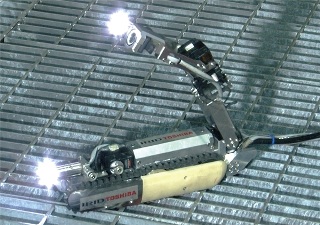Jun 30 2015
Toshiba Corporation today announced that the company and the International Research Institute for Nuclear Decommissioning (IRID) have developed a small robot to investigate the interior of the primary containment vessel (PCV) of Fukushima Daiichi Nuclear Power Station Unit 2. Training of robot operators will begin in July, with the aim of deployment on site by the end of August.
 Robot(investigating with two cameras)
Robot(investigating with two cameras)
Developing procedures and methodologies for removing fuel debris from the PCV requires an understanding of its distribution. The robot will be used to determine the location and positioning of fallen objects, if any, and conditions along access routes to the PCV base. This must be done prior to a full investigation around the PCV base.
The robot is approximately 54cm long and 9cm high and wide, and is equipped with two cameras, LED lights, a radiation dosimeter and a thermometer. Remotely operated by a wired cable, the robot will enter the PCV along a pipe approximately 10cm in diameter.
【Toshiba】A Robot Developed to Investigate PCV Interiors of Fukushima Daiichi Unit No.2
LED lights and CCD cameras are attached to both the front and rear of the robot. Once the robot reaches a point near the center of the PCV, the operator will raise the rear section, like the tail of a scorpion and video the interior of the PCV: the robot will illuminate its surroundings with the LED lights, and swivel its rear to capture a wide area of the PCV, even in darkness or fumes. The robot is designed to be self-righting, so rollovers are not a concern.
Toshiba and the IRID will continue to develop technologies that contribute to the decommissioning of the Fukushima Daiichi Nuclear Power Station.